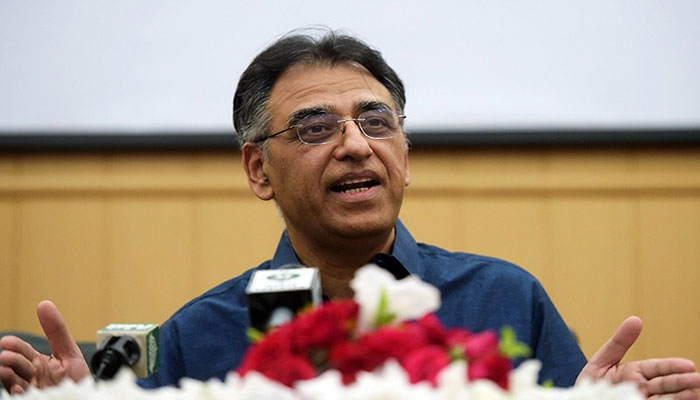CPEC, a thorn in enemy’s side: Asad Umar
ISLAMABAD: Federal Minister for Planning Asad Umar Thursday has said the China-Pakistan Economic Corridor (CPEC) was a thorn in the enemy’s side, but it would not stop even if they make attempts on it.
He was addressing a news conference, along with Special Assistant to Prime Minister (SAPM) on CPEC Khalid Mansoor, after concluding much-awaited virtual 10th Joint Cooperation Committee (JCC) under CPEC here. He said CPEC was a target of some forces in the world "particularly our eastern neighbour whom it stings and there is no doubt about this".
He said the government was aware of threats to CPEC and had enhanced the security arrangements to deal with any untoward situation, in an effective manner. The minister said Pakistan had assured China of providing enhanced security to all the projects, financed by it, through two special security divisions, dedicated to CPEC, and resolving the issue of outstanding payment of $1.4 billion with the Chinese companies for producing electricity.
Asad Umar said the idea of a revolving fund already existed. Therefore, that idea or any other mechanism would be devised to ensure timely payment of outstanding amounts of $1.4 billion or Rs230 billion to the Chinese companies for producing electricity.
He said that the pace of accumulation of circular debt had improved, and the outstanding amounts of Chinese companies in the range of $1.4 billion would be paid.
The minister said the project of Mainline (ML-1) for up-gradation of rail link from Peshawar to Karachi came under discussion during the JCC meeting. The Chinese side is asking for combination of Chinese RMB currency and US dollar for execution of ML-1, while Pakistan wanted its financing only in dollar because our international trade is done in the US dollar. Both sides also discussed interest rate for charging multi-billion dollar ML-1, he added. Pakistan and China are negotiating financing agreement for ML-1 for the last three years, but so far both sides remained unable to achieve success.
“Now we are entering the second phase of CPEC, where the Special Economic Zones (SEZs) and industrial cooperation will become functional and Chinese companies will make substantial investments.
“In the first phase, the projects related to energy and infrastructure got implemented having worth of $25 billion under which $15 billion projects have been accomplished while $12 billion were under implementation,” Asad Umar said.
The minister said Dasu project was not part of CPEC, but the government assured Chinese side that all those involved in killing of Chinese engineers would be caught and produced before the court of law for giving them exemplary punishment over their heinous crimes.
He said that it was exciting development that Pakistan and China signed a memorandum of understanding for establishing Joint Working Group (JWG) for cooperation in the area of information technology (IT). He said that Pakistan and China enjoyed unique friendly relationship; therefore, the Chinese energy projects would get treatment in similar manner.
According to an official announcement, the 10th meeting of the Joint Cooperation Committee (JCC) on CPEC was held on Thursday through videoconference. The meeting was co-chaired by Asad Umar, Minister for Planning, Development & Special Initiatives, and Ning Jizhe, Vice Chairman of the National Development and Reform Commission (NDRC) of the People’s Republic of China.
Asad thanked the Chinese government for unprecedented support to Pakistan in its efforts to combat Covid-19. He said Phase-2 of CPEC was even more promising as the prime minister had already issued directions for empowering SEZ Authorities and Management Companies to provide full facilitation to investors. It has also been decided to establish a dedicated Investor Facilitation Centre for Chinese investors.
During the meeting, the conveners of the JWGs on Energy, Transport Infrastructure, Gwadar, Socio-Economic Development, Security, Long-Term Planning of CPEC, Industrial Cooperation, International Cooperation, Science & Technology, and Agriculture Cooperation made a presentation highlighting the progress on their specific areas and the future plans of actions.
The matters discussed during the JCC included: 700-MW Azad Pattan Hydropower Project; South-North Gas Pipeline; Policy Framework for Thar Coal Gasification; Strategic Underground Gas Storages; National Seismic Study of Sedimentary Area; Joint Prospecting, Exploration, Development, and Marketing of Metalic Minerals, Dir Motorway Project; Peshawar-DI Khan Motorway; Clean and Green Gwadar Movement Project; Karachi Coastal Comprehensive Development Zone; Potential Cooperation in the Copper-Gold mine exploration, Stone processing and other areas of mutual interest.
In Agriculture, the area of particular emphasis would be Germplasm resources; Capacity building; Agriculture Product Processing; Agriculture Technology extension; Fishery Sciences and Technology, Aquaculture and Aquatic Product Processing; Establishment of Foot and Mouth Disease (FMD) Free Zones in Pakistan among other things.
An MoU was also signed for establishment of a Joint Working Group (JWG) on Information Technology Industry. Letter of Exchange of Provision of Balochistan Solar Power Lighting Equipment and Provision of Medical Equipment and Material were also signed.
The JCC also announced signing of an MoU on Karachi Coastal Comprehensive Development Zone (KCCDZ) and Agreement of Cooperation Framework between Ningbo Port and Gwadar Port as well as Lease deed of Gwadar Expo Centre.
The chief ministers expressed their satisfaction with the progress of the projects and made suggestions for new projects. The meeting was attended by federal ministers, chief ministers, AJK prime minister, federal secretaries and senior officials.
-
 Timothee Chalamet Shares Major Learnings After Working With 'favourite' Director Christopher Nolan
Timothee Chalamet Shares Major Learnings After Working With 'favourite' Director Christopher Nolan -
 Timothee Chalamet Heaps Praise For Matthew McConaughey's Work In Super Hit Project 'Interstellar'
Timothee Chalamet Heaps Praise For Matthew McConaughey's Work In Super Hit Project 'Interstellar' -
 British MPs Pass A Motion Due To Andrew: ‘Lets Remove The Bandages From Our Mouths
British MPs Pass A Motion Due To Andrew: ‘Lets Remove The Bandages From Our Mouths -
 Prince Edward Forced To Skip Royal Engagement With King Charles
Prince Edward Forced To Skip Royal Engagement With King Charles -
 Sharon Osbourne Says Ozzy Osbourne 'knew' He Could Die Ahead Of Last Black Sabbath Show
Sharon Osbourne Says Ozzy Osbourne 'knew' He Could Die Ahead Of Last Black Sabbath Show -
 Telegram Co-founder Pavel Durov Under Investigation: Russian State Media
Telegram Co-founder Pavel Durov Under Investigation: Russian State Media -
 Ethan Hawke On Regrets He Had Related To Daughter Maya Hawke: 'Really, Really Hard'
Ethan Hawke On Regrets He Had Related To Daughter Maya Hawke: 'Really, Really Hard' -
 Here's What 'Lizzie McGuire' Alum Jake Thomas Said About On Screen Dad Robert Carradine Ahead Of Death
Here's What 'Lizzie McGuire' Alum Jake Thomas Said About On Screen Dad Robert Carradine Ahead Of Death -
 Nvidia Earnings Face AI Boom Test Amid Intensifying Market Competition
Nvidia Earnings Face AI Boom Test Amid Intensifying Market Competition -
 UK Government Sign Off On Releasing Confidential Documents About Andrew: Here’s Why Now
UK Government Sign Off On Releasing Confidential Documents About Andrew: Here’s Why Now -
 David Bowie's Daughter Alexandria Lexi Jones Recalls Painful Childhood Trauma: 'That Is Abuse'
David Bowie's Daughter Alexandria Lexi Jones Recalls Painful Childhood Trauma: 'That Is Abuse' -
 Prince Harry Speaks Directly To Ukraine In An Emotional Statement: Watch
Prince Harry Speaks Directly To Ukraine In An Emotional Statement: Watch -
 Kelly Clarkson Gushes About 'The Voice' Contestants' Sweet 'gift': 'You Are My Favorite'
Kelly Clarkson Gushes About 'The Voice' Contestants' Sweet 'gift': 'You Are My Favorite' -
 Kelly Clarkson Recalls Facing Prejudice From Music Execs After Winning 'American Idol' In 2002
Kelly Clarkson Recalls Facing Prejudice From Music Execs After Winning 'American Idol' In 2002 -
 Demi Lovato Thought She Was 'maxed Out On Love' For Jordan 'Jutes' Lutes On Wedding Day
Demi Lovato Thought She Was 'maxed Out On Love' For Jordan 'Jutes' Lutes On Wedding Day -
 Director Of UK Airline Parts Firm Jailed Over $9m Fraud
Director Of UK Airline Parts Firm Jailed Over $9m Fraud




